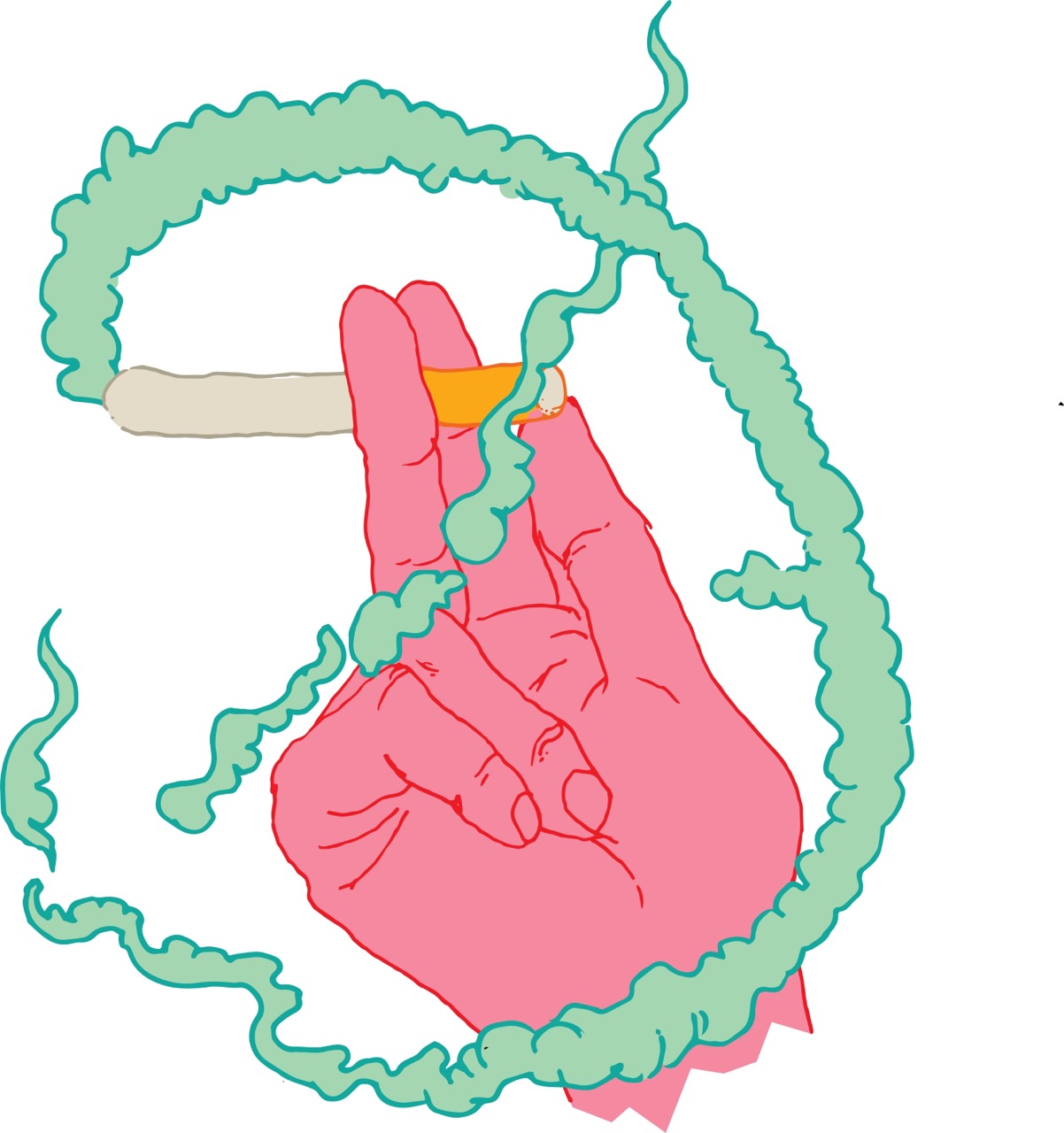
From Richmond to Walla Walla, Cigarettes Unite Us All.
Sebastian Vera Cuevas
You’ve seen it – the long black letters resting proudly on a white and red background: Marlboro, the go-to American cigarette straight from Richmond.
As Whitman looks to ban cigarettes, people across campus are wondering: Why? They’re already prohibited indoors, and in closed spaces, leaving only open air, public areas on campus. History has made it irrefutably clear time and time again that banning a narcotic is NOT an effective solution; in fact, bans often backfire and yield the complete opposite result.
Take marijuana, for instance. Aside from its rampant use on college campuses (despite not just a school ban, but a prohibition of the substance for any federally-funded school), cannabinoids and their relaxing results are popular and often go unpunished by campus authorities. Beyond legal restrictions and punishments, it must be noted that consumption of cigarettes, much like its cannabinoid counterpart, won’t cease with an arbitrary and despotic ban. Instead, as evidenced in multiple cities across the country, it will merely encourage users to acquire and consume cigarettes in more elicit ways and places, creating the perfect storm for consumption-in-hiding, or worse, turning to other, less researched vehicles of vice like the vape pen.
Many will say that the smoking ban is a means to better protect the health of the community, but that simply isn’t true. If Whitman is truly community-oriented, wouldn’t that also include the marginalized groups that are more likely to use cigarettes as a means to remember home or socialize? Let’s look past the smaller group of middle-class and wealthy students doing it for the aesthetic. To prioritize the community would imply acknowledging the rich diversity of nationality, culture and economic background on campus, and recognizing the freedoms of those over the age of 21.
To prioritize community would mean acknowledging that a ban would disproportionately affect international students.
To prioritize community would mean instituting policies that enforce a certain distance from buildings within which you can’t smoke – something many places already enforce.
To prioritize community would mean acknowledging the target this would put on the backs of minorities and low-income students, who have a smoking rate nearly twice as high as their wealthier, whiter counterparts.
If Whitman wants to prioritize community, they’d disprove the all too common criticism that they preach inclusion and overlook or, in this case, target the very students they seek to include with their “progressive” policies.
As Whitman’s political climate among students and faculty continues to grow ever more volatile, and student complaints about a myriad of different issues on campus like inclusion and equity continue to go unaddressed, cigarettes seem like the least of the administration’s problems.
This policy, whether Whitman likes it or not, will target students of color and low income students – reversing what the administration has worked so diligently to achieve in the past few years, admitting one “most racially and economically diverse class ever” after the other. What use are Whitman’s efforts at DEI if we’re still marginalized and targeted based on our country of origin, our race or our income? Any student on campus will tell you that the ban is in no way going to stop students, especially those of legal age, from smoking. If the administration is truly interested in improving the health of students on campus, they’d spend more time educating students, prohibiting the use of cigarettes within a certain distance of buildings and offering or better advertising resources to help people quit smoking, vaping, drinking or consuming any other type of drug at the health center instead of this sweeping ban for those who can already legally consume cigarettes.
A Ban is Good For All of Us
Lily Yost
Whitman students are always demanding that the college do better. As the student body, it’s our job to ensure Whitman acts in our best interest. The proposed smoking ban is the college doing just that, and it doesn’t matter if you don’t like it.
Consider it akin to a parent confiscating a beloved Game Boy from a reluctant child. Initially met with resistance, the kid eventually finds greater happiness playing outside with friends. Similarly, just as a parent’s duty is to safeguard their child’s well-being, Whitman students need to trust the college’s decision to prioritize our community’s welfare.
Now, I know what you’re thinking. We’re adults, and we don’t need admin snatching away our toys. Maybe it’s even insulting – it’s my God-given right to blacken my lungs if I so please. Whitman has no authority to play parent.
But, let’s face it, Whitman does this all the time. Many of us committed to Whitman because it’s a community-oriented college. With only about fifteen hundred of us, our small size keeps us tight-knit. So when students light up outside the library or pair their morning latte with a cig, it’s no surprise admin steps in. Whitman acts collectively; we prioritize community health even if it compromises individual liberties. It’s akin to Whitman’s vaccine requirements or mask mandates when COVID numbers spike. If there’s a public health concern, Whitman doesn’t shy away from limiting our choices. We all signed up for this upon committing to Whitman.
I don’t need to tell you that nicotine is highly addictive, but I will remind you that its addictive properties are on par with heroin and cocaine. And, as the college noted in the policy draft to ban smoking, risk for addiction peaks before your mid-20s. On top of that, your chances of successfully quitting drop. People who pick up smoking later in life have higher chances of quitting, and yet less than 1 in 10 adult smokers successfully quit. Not to mention nicotine can set you on a trajectory for more substance abuse. It stimulates a gene linked to cocaine addiction and increases the likelihood of dependence on “hard drugs.”
You’ve probably noticed that nicotine use tends to cluster in groups. If you are surrounded by people who smoke or vape, you’re more likely to pick it up yourself and become addicted. It’s safe to say that smoking is socially contagious. And yes, there’s something nice about sharing a smoke break, similar to conversing over a cup of coffee or a beer – it’s a way to put aside responsibilities and talk to people.
But the cost is no joke. Smoking is the number one cause of preventable death, claiming 480,000 lives every year. So instead of a cig, go get an iced matcha. Or if you’re really desperate, just go off campus and smoke there!
Many of you will argue that the ban won’t work, and it’s true; it won’t be foolproof. Vaping is so discreet that students can puff inside the library. People might think twice about lighting up traditional cigarettes in broad daylight, but the inconspicuous vape poses a negligible challenge for our security guards. There’s a concern that cigarette aficionados might make the switch to vaping. But, let’s not forget, smokers are creatures of habit, often loyal to their chosen vice. Plus, considering the simplicity of taking a few steps beyond campus boundaries, the ban is unlikely to prompt a mass exodus of cigarette users to e-cigs. Convenience doesn’t always trump personal preference.
The policy is not a scare tactic. There’s no list of sanctions or disciplinary threats; it opts for an educational approach. Those who breach the policy receive a friendly nudge toward awareness, with sanctions only looming on the horizon if someone becomes a repeat offender. The real essence lies in communicating that smoking isn’t just a personal choice; it’s about safeguarding the health of our community.
Sure, students can still smoke, but they’re more likely to head off campus or to the designated smoking area. The inconvenience of walking the extra steps will likely dissuade others from joining in on the smoke break. Of course the policy is not going to stop students from smoking altogether, but it can diminish the smoking culture that has emerged at Whitman in recent months. And in the long term, maybe even save some lives.





julie • Feb 29, 2024 at 1:51 pm
I enjoyed reading two opinion pieces on the one topic.
Lily Yost’s makes a significant point: when we enter a community, we are agreeing to respect and adhere to the preferences of the community. Parents teach their kids that the rules change from community to community so they are prepared to be respectful even if they don’t agree or like the rules. A no-shoes house means leave shoes at the door. Just because there may be students of legal drinking age, does not mean J-Caf should serve alcohol. The opinion pieces point out that the Whitman community has been thoughtful in creating space for those who do want to smoke traditional cigarettes. It’s has struck a balance between those who want to enjoy cigarettes and those who do not want the second-hand smoke nor the butts on the ground.